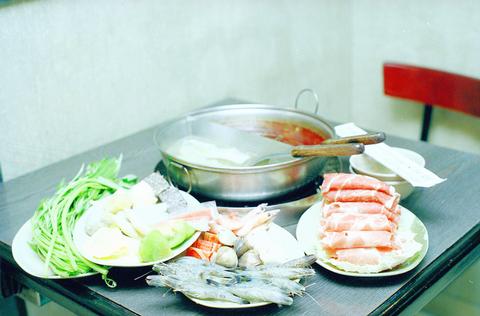As the weather cools down, hot pot establishments are gearing up for business. Of course, there are way too many hop pot places around, and the range of price and quality can vary substantially. All-you-can-eat places are often regarded with justifiable suspicion, and places priding themselves on their quality can be anything but cheap. One place that is getting the mixture right is Buma Bula, which over the last four years has established eight outlets in Taipei and has recently expanded to Taichung.
With its Japanese-inspired minimalist decor, Buma Bula provides a comfortable environment very different from the spit and sawdust atmosphere that dominates in the all-you-can-eat hot pot scene. The laid-back piped jazz is also a factor that sets it apart from more traditional hot pot outlets.

PHOTO: IAN BARTHOLOMEW, TAIPEI TIMES
"Competition is really intense among hot pot shops," said Kuo Yue-chen (
The refrigerated display is heavily laden with goodies, all of which look remarkably fresh. "We work on a very low margin," Kuo said, "but with business so good, you can be sure that everything is fresh."
Kuo said that Buma Bula, with its nine outlets, is in a strong position to demand the best from its suppliers. Beef and lamb are both imported from New Zealand, the seafood is snap frozen, and displays of the more expensive items such as crab and intestines are extremely generous.
"In most traditional hot pot stores, things like large intestine or crab cost you over NT$200 for a plate," Kuo said, "but we offer them here at no extra cost." The miniature crabs and swimmer crabs are really attractive options, especially dunked into the boiling chili broth that is the specialty of the house.
The chili stock comes in levels of spiciness, Kuo said, but refusing to divulge the "secret" recipe. Suffice to say, it has a multi-layered flavor and is mercilessly devoid of MSG. A chicken stock and pickled cabbage options are also available for those who want something less spicy.
When you can no longer stuff even one more shrimp into your distended belly, Buma Bula offers you Du Royal ice cream and make-it-yourself shaved ice desserts all included in the single price of NT$250 for lunch and NT$300 for dinner. Dinner prices apply after 3pm.
All Buma Bula outlets will be open until 3am on Christmas Eve and New Year's Eve. If you don't want to be kept waiting for a table, a reservation is essential.

June 9 to June 15 A photo of two men riding trendy high-wheel Penny-Farthing bicycles past a Qing Dynasty gate aptly captures the essence of Taipei in 1897 — a newly colonized city on the cusp of great change. The Japanese began making significant modifications to the cityscape in 1899, tearing down Qing-era structures, widening boulevards and installing Western-style infrastructure and buildings. The photographer, Minosuke Imamura, only spent a year in Taiwan as a cartographer for the governor-general’s office, but he left behind a treasure trove of 130 images showing life at the onset of Japanese rule, spanning July 1897 to

One of the most important gripes that Taiwanese have about the Democratic Progressive Party (DPP) is that it has failed to deliver concretely on higher wages, housing prices and other bread-and-butter issues. The parallel complaint is that the DPP cares only about glamor issues, such as removing markers of Chinese Nationalist Party (KMT) colonialism by renaming them, or what the KMT codes as “de-Sinification.” Once again, as a critical election looms, the DPP is presenting evidence for that charge. The KMT was quick to jump on the recent proposal of the Ministry of the Interior (MOI) to rename roads that symbolize

On the evening of June 1, Control Yuan Secretary-General Lee Chun-yi (李俊俋) apologized and resigned in disgrace. His crime was instructing his driver to use a Control Yuan vehicle to transport his dog to a pet grooming salon. The Control Yuan is the government branch that investigates, audits and impeaches government officials for, among other things, misuse of government funds, so his misuse of a government vehicle was highly inappropriate. If this story were told to anyone living in the golden era of swaggering gangsters, flashy nouveau riche businessmen, and corrupt “black gold” politics of the 1980s and 1990s, they would have laughed.

In an interview posted online by United Daily News (UDN) on May 26, current Chinese Nationalist Party (KMT) Chairman Eric Chu (朱立倫) was asked about Taichung Mayor Lu Shiow-yen (盧秀燕) replacing him as party chair. Though not yet officially running, by the customs of Taiwan politics, Lu has been signalling she is both running for party chair and to be the party’s 2028 presidential candidate. She told an international media outlet that she was considering a run. She also gave a speech in Keelung on national priorities and foreign affairs. For details, see the May 23 edition of this column,